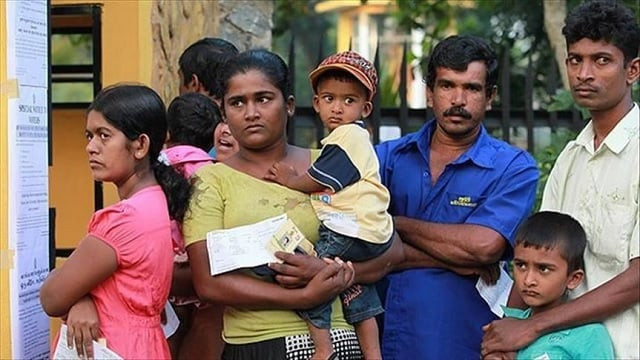Sri Lanka ruling party runner woos women with free sanitary pads
Sajith Premadasa's pledge to distribute free sanitary napkins to women if elected draws mix reactions

PHOTO: ANADOLU AGENCY
But the pledge, which has been welcomed by various quarters, has also earned 52-year-old Sajith Premadasa severe flak from conservative Sri Lankan men and women who have labelled him "padman" for unnecessarily drawing attention to what some say is a taboo subject, as it focuses on menstruation.
Sanitary napkins are considered a luxury product in the country and were taxed at 100 per cent until last year.
Myths and menstruation: Overcoming Pakistan's period taboo
Women makeup nearly 52 per cent of Sri Lanka's population and have a big stake in the election, so many of the 35 presidential candidates are paying increased attention to their grievances.
The two main contenders are Premadasa and his opponent, Gotabaya Rajapaksa, 70, a former defence secretary and the brother of ex-President Mahinda Rajapaksa. Both candidates have increasingly focused on women's issues.
In a series of posts on Twitter, Premadasa, quoting UNICEF, said more than half of adolescent girls in Sri Lanka miss school when they have their periods, which impacts the education of girls. He said the current government reduced the 100 per cent levy on sanitary products to 63 per cent but thousands of women still suffer stigma and put themselves at risk every month.
"I will not shy away from this conversation. If we are serious about women's empowerment, this is a basic place to begin. Until sustainable cost-effective alternatives are found, I stand by my promise to provide sanitary hygiene products free of charge. I remain committed to women's rights. I will wear the #padman label proudly," he said
While many women took to social media to show their appreciation and applaud Premadasa for highlighting the rather unusual issue, he also faced a barrage of criticism which mainly emanated from the Rajapaksa camp.
Pavithra Wanniarachchi, a female Member of Parliament from the Rajapaksa camp accused Premadasa of suddenly being concerned of women welfare.
"In the past, women faced various hardships, including during the war and the recent bomb attacks, but Premadasa never spoke on behalf of women. But now suddenly he is concerned about them," she told Anadolu Agency.
Wanniarachchi also questioned how Premadasa was going to distribute free sanitary pads when he and his government lacked the ability to provide gas for domestic cooking. Sri Lanka has been facing a shortage of liquefied petroleum gas (LPG) used for cooking in homes and restaurants for several weeks due to tight supplies in the market.
"He is a member of the government, and they have failed to address many issues facing women, including the shortage of gas. If he can't provide gas for Sri Lankan women, how can he provide pads for them?" she said.
Wanniarachchi went on to say that Sri Lankan culture is different and menstruation and sanitary napkins are not topics women discuss in front of their brothers and sons, let alone in public.
"When he's going to lose, he's making so many promises. He will learn his lesson on Nov. 16."
Despite the criticism, Premadasa's sanitary napkin-centric campaign has also earned him praise in neighbouring India from Arunachalam Muruganantham, a social entrepreneur from Coimbatore in Tamil Nadu state of India who invented the low-cost sanitary pad-making machine and is credited with generating awareness about traditional unhygienic practices around menstruation in rural India.
In a Facebook post, Muruganantham said it is a welcomed change to see leaders across the world finally understanding the importance of menstrual hygiene and women's health for the development of their respective countries.
"They are announcing various initiatives in their election manifesto. Recently Sajith Premadasa, presidential candidate, Sri Lanka talked about affordable menstrual hygiene awareness. He is happy to be called PadMan and promised to give free pads to women and girls. It's high time the leaders of nations become ambassadors for Menstrual Hygiene Awareness," he said.
However, a Sri Lankan actor, Bandu Samarasinghe took the stage at an election campaign rally of Rajapaksa to criticise Premadasa. He said speaking about sanitary napkins was unnecessary and also shameful to women.
"I have been married for 40 years, and I still don't know what that is and he makes it sound as if it's as simple as going to the shop to buy bread," he said.
Subha Wijesiriwardena, program manager for gender and sexuality at the Women and Media Collective organisation, Sri Lanka's leading feminist research and activist organisation, was of the opinion that the tax slapped on sanitary products in Sri Lanka is 'ridiculous.' She said such a tax was also downright sexist and also goes to show how a capitalist free-market economy is based on values which ultimately divide and widen the gap between certain classes of citizens.
Too poor for periods: Girls in Zimbabwe rely on rags, paper, leaves
Wijesiriwardena also noted that while women's rights have often been a focal point ahead of elections, it tends to be dropped soon after.
"This is a common trend, so we have to face facts. There may be scepticism, but that's natural and understandable," she told Anadolu Agency.
"Women and others have good reason to be suspicious and to not buy into a politician making promises based on our everyday struggles. I think it's necessary to view whatever promises are made in a broader context of that politician's history of advocacy for that particular cause," she added.



















COMMENTS
Comments are moderated and generally will be posted if they are on-topic and not abusive.
For more information, please see our Comments FAQ